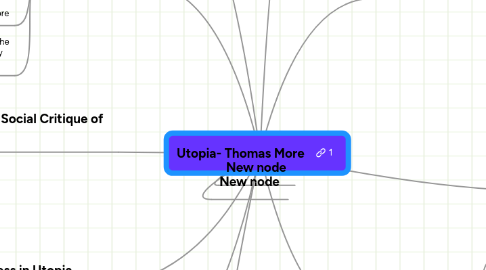Utopia- Thomas More
создатель Kayla Fay


1. Christian Synthesis
1.1. The Christian aspect of the synthesis is Christ's gospel of caring for the poor, the oppressed and the downtrodden
1.2. The Platonic, Republican tradition is the Greek aspect of the synthesis
1.3. More wrote Utopia with a comedic tone, allowing him to speak his truth while telling a deeper story
2. Humor and Parody
2.1. Utopia means "nowhere" which is More saying that this place can never exist
2.1.1. New node
2.2. The local political system is called a Sty, which is More calling all the people in Great Britain pigs
3. Working Life
3.1. Agriculture is the most important job and every person spends at least two years in the countryside working and farming with men and women doing equal work
3.2. Besides that, people must learn at least one trade that will benefit society such as weaving, carpentry, and masonry.
3.3. All able-bodied people must participate in the work for at least six hours per day unless they wish to do more
3.4. No dressmakers because everyone wears the same simple clothing so as to disregard any social classes
4. Utopia as a Social Critique of Britain
4.1. It focused on a sort of communism and portrayed More's pride in communal service and a simpler society that is easier to understand
4.2. This is the complete opposite of Britain during More's time, which was a monarchy with social classes that were very difficult to move between. You either had money or you did not; nothing was communal and everyone was trying to survive
5. Happiness in Utopia
5.1. The freedom in Utopia could possibly bring happiness: freedom to worship and believe whatever one wants, freedom to marry and divorce, freedom to work as long as you want after you have completed six hours, and just a general sense of family and connection which brings peace and avoids conflict that could create unhappiness.
5.1.1. New node
